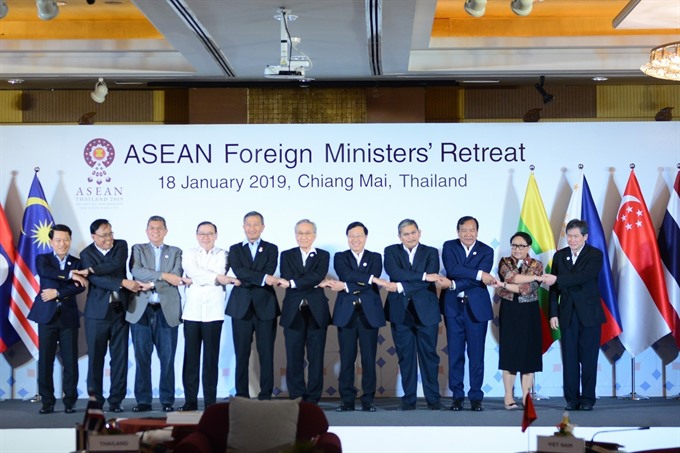 Politics & Law
Politics & Law

Vietnamese Deputy Prime Minister and Foreign Minister Phạm Bình Minh yesterday called on the Association of Southeast Asian Nations (ASEAN) to consider solidarity, unity and its central role as core priorities orienting all of its activities.
 |
| Foreign ministers of the Southeast Asian bloc do the ASEAN handshake at the ASEAN Foreign Ministers’ Retreat in Thailand. — VNA/VNS Photo |
BANGKOK — Vietnamese Deputy Prime Minister and Foreign Minister Phạm Bình Minh yesterday called on the Association of Southeast Asian Nations (ASEAN) to consider solidarity, unity and its central role as core priorities orienting all of its activities.
ASEAN member countries should closely co-ordinate and support each other to promote creativity, assist start-ups and develop high-quality human resources amidst the Fourth Industrial Revolution, the diplomat said while addressing the ASEAN Foreign Ministers’ Retreat that concluded in Thailand on January 18.
Given the complex developments of the East Sea (internationally known as the South China Sea) situation and increasing militarisation in the area, Minh urged ASEAN to maintain its solidarity and common voice. Doing so would contribute to regional peace, stability and security on the basis of principles covering self-restraint, zero militarisation and full and effective implementation of the Declaration on the Conduct of Parties in the East Sea (DOC), towards an effective and efficient Code of Conduct in the East Sea (COC) in line with international law, including the 1982 UN Convention on the Law of the Sea (1982 UNCLOS).
During the two-day retreat, ministers reviewed the building of the ASEAN Community and discussed the realisation of the outcomes from the 33rd ASEAN Summit that took place last November, according to a press statement issued following the event.
More than 80 per cent of ASEAN’s action lines had been implemented while the 10-member group’s combined economy grew at over 5 per cent during 2018.
ASEAN was looking at various measures, including an initiative to build networks of smart cities and cybersecurity, in order to adapt to the intensive and extensive impacts of the Fourth Industrial Revolution.
The ministers also reached a consensus on ASEAN’s 2019 theme of “Advancing Partnership for Sustainability”, and agreed to carry out a range of initiatives in different areas.
Member countries will step up efforts to ensure peace and security, and effectively cope with non-traditional security challenges.
At the same time, ASEAN will increase communications work, people-to-people exchanges and social welfare, while consolidating its capacity for combatting natural disasters.
ASEAN stands ready to enhance comprehensive co-operation with its partners; carry forward its central role; and build an open, transparent, and inclusive regional architecture based on international laws.
The ministers said ASEAN needed to regularly discuss the East Sea issue, and noted their concerns over reclamation work and other activities that had eroded trust, increased tensions and harmed regional peace and security.
They agreed to push ahead with negotiations of the COC in an effective and efficient manner, including the completion of the first reading of the Single Draft COC Negotiating Text in 2019.
They also agreed to continue assisting Myanmar in stabilising the life of locals in Rakhine state, and welcomed positive developments on the Korean Peninsula.
ASEAN groups together 10 member nations of Brunei, Cambodia, Indonesia, Laos, Malaysia, Myanmar, the Philippines, Singapore, Thailand, and Việt Nam. — VNS